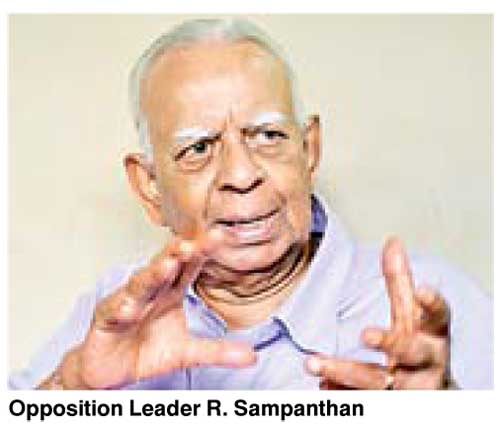Saturday Feb 21, 2026
Saturday Feb 21, 2026
Tuesday, 8 September 2015 00:02 - - {{hitsCtrl.values.hits}}
My unambiguous opinion is that R. Sampanthan is a gentleman of the old school, one of the finest Parliamentarians we have and ranks high among the few such left such as Dinesh Gunawardena. As an individual, he is streets ahead of the person named by the pro-MR camp as its choice of Leader of the Opposition (Dinesh or Dullas, Vasu or Vidura would have been far better).
Therefore my opinion that it was a blunder to name Sampanthan as the Leader of the Opposition does not derive from any personal criticism or any doubts whatsoever about his abilities. If I may be clearer still, my critique is not sourced in his ethnicity either – were he Neelan Tiruchelvam or Dharmalingam Siddharthan, I might even be cheering.
I have two objections or one objection and one doubt, about his appointment. The first stems from the first principles of democratic  politics: popular sovereignty; the will of the people. When Amirthalingam was made Opposition Leader, it was because the TULF had won more seats than the SLFP. That is manifestly not the case today.
politics: popular sovereignty; the will of the people. When Amirthalingam was made Opposition Leader, it was because the TULF had won more seats than the SLFP. That is manifestly not the case today.
On 17 August, the people voted for a weak UNFGG Government and a strong UPFA Opposition. The fact that this was subsequently manipulated and distorted by the formation of a national government is neither here nor there. The UPFA has 95 seats. Even if one subtracts those SLFP MPs who turned their backs on their popular mandate and voted in favour of a national government, the remainder is numerically the larger part of the SLFP/UPFA group. Most pertinently, they are numerically several times larger than the 16-member TNA.
The fact that Prof. Warnapala, as (un-ratified) UPFA General Secretary conveyed to the speaker a decision (not taken by any collective deliberation of the UPFA) to step aside from the post of Opposition Leader, cannot obscure the realities, both arithmetical and sociopolitical. It is but a mere technicality.
Earlier this year, we had a minority Government. Today we have a minority Government (the people elected 106 UNF MPs) turned artificially into one with a near two-thirds majority by an infusion from the SLFP which ran on the ticket of opposing a national government. We also have a minority Opposition; one which has fewer seats than those of the UPFA who voted against or abstained from voting for a national government and thereby signalled their dissent.
The Opposition is a minority opposition in another more obvious sense: the popular vote was for a strong Opposition representing large numbers of the majority Sinhala Buddhists. They have now been disenfranchised—their political option and their individual voter preferences have both been ignored in the formation of a national government, the sneaking in of those defeated in the popular vote and in the decapitation by fiat of a strong national opposition. In its stead we have an Opposition drawn from a regional party and representing a majority of a minority. Thus has popular sovereignty been ignored and flouted several times over.
"On 17 August, the people voted for a weak UNFGG Government and a strong UPFA Opposition. The fact that this was subsequently manipulated and distorted by the formation of a national government is neither here nor there. The UPFA has 95 seats. Even if one subtracts those SLFP MPs who turned their backs on their popular mandate and voted in favour of a national government, the remainder is numerically the larger part of the SLFP/UPFA group. Most pertinently, they are numerically several times larger than the 16-member TNA"
Sampanthan’s problem is the same as that of Amirthalingam: politico-programmatic and ideological schizophrenia. Their great individual political ability and integrity were hamstrung by the parochial passions of their constituency. Though Prabhakaran and his war are no more, these were, as Sampanthan would be the first to claim, as much symptom as cause. Where he would disagree is with my assertion that Prabhakaran and the war were as much, or far more, a symptom of obdurate Tamil political exceptionalism than of obstructionist Sinhala exceptionalism.
The crux of the problem is that on the one hand the only viable solution is a middle path or golden mean, and is based on the 13th Amendment, while on the other hand Sampanthan’s ideology and mandate are based on self-determination, the re-merger of the north and east without a referendum, the rejection of the unitary state formation and the 13th Amendment in favour of Chandrika’s federalising “union of regions package”(which the new Leader of the Opposition made an elliptical reference to) and a lacerating war crimes inquiry with international involvement (which the Sinn Fein/IRA never raised in the Good Friday agreement or since).
Sampanthan’s political discourse is more strident than that of the Catholic minority of Northern Ireland as expressed in the stances  and demands of Sinn Fein, which makes him more radical than Gerry Adams and Martin McGuiness—neither of whom leads the Opposition in Westminster!
and demands of Sinn Fein, which makes him more radical than Gerry Adams and Martin McGuiness—neither of whom leads the Opposition in Westminster!
The TNA-CBK-Mangala agenda may be possible within Parliament, with the new math of a contrived bipartisan consensus, but is drastically at variance with actual public opinion on the ground, as reflected in the popular vote. As even the world’s sole superpower realised, it is one thing to cobble a “Coalition of the willing”, but quite another to achieve a stable and sustainable political outcome, if it is not reflective of the actual national consensus and devoid of broad popular consent.
Our new rulers are making the mistake which the British colloquialism describes so well as being “too clever by half”.
As my late father Mervyn de Silva (whose 86th birth anniversary fell on 5 September) prophetically cautioned the arrogant J.R. Jayewardene regime before the country was engulfed in conflict and destruction leaving that regime to run for cover, it is “self-destabilising” to confuse “legality” with “legitimacy”.
What the UNF-led National Government has done may well be legal but it is not legitimate. Illegitimacy masked by mere legality is bad enough, but when illegitimacy is combined with an overriding of political reality—the actual balance and ratio of public opinion was for a weak government and a strong opposition—then, crisis, conflict and catastrophe prove inevitable. The tragedy is that these were needless and avoidable, and were provoked by political greed and imprudence.